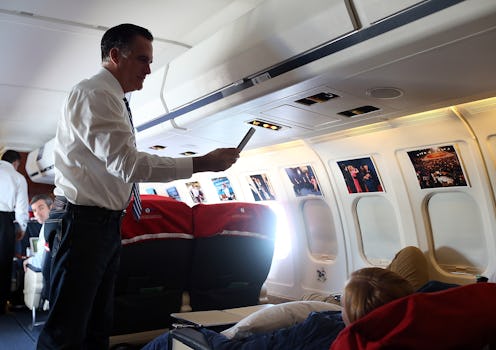News
What's the Deal with In-Flight Calls Now?
Too many pilots in the cockpit? Washington’s struggling to figure out how exactly the FAA's recommendations that the ban on in-flight electronics use be overturned. Two agencies, the Federal Communications Commission (FCC) and the U.S. Department of Transportation (USDOT) — as well as three Congressmen — are all independently trying to figure out what to do. In the end, what they decide might not matter anyway: ultimately, the decision of whether or not to allow in-flight use will likely rest with the private airlines.
Late Thursday night, the FCC voted 3-2 that they would start a public comment process that will consider lifting the ban on in-flight cell phone use. Their stance, according to chairperson Thomas Wheeler, is that they think electronic use is fine when there is no technical reason not to allow use. Sounds reasonable enough.
On the other side of the fence is the Department of Transportation. Their stance is that the FCC needs to deal with both the “technical feasibility of the use of mobile devices in flight” and whether it’s “fair to consumers.” And so far, it’s not looking good for those who want to chat at 35,000 feet, according to a statement made by USDOT Secretary Anthony Fox:
Over the past few weeks, we have heard of concerns raised by airlines, travelers, flight attendants, members of Congress and others who are all troubled over the idea of passengers talking on cell phones in flight — and I am concerned about this possibility as well.
Meanwhile, bipartisan legislation (!) has been introduced by Senators Dianne Feinstein (D-Calif.) and Lamar Alexander (R-Tenn.) to ban conversations on commercial flights. In the House, Rep. Bill Shuster (R-Penn.) is leading a bill that bans voice calls — but allows texting.
It doesn’t look like passengers are in favor of the cell-phone ban being overturned, either: An AP poll found that the majority of Americans who take to the skies oppose the ban being lifted. For citizens who have flown at least one flight in the past year, 59 percent are against the ban being lifted, and for those at four or more flights, those against climbs to 78 percent.
The ban comes down to an interesting, deeper question, though: Should we lift a technologically needless ban in favor of the individual’s greater freedom, as the FCC would have it? Or do we go the USDOT’s way and let a socially-restrictive ban remain if it’s backed by citizens? Even Wheeler isn’t for the ban, but philosophically, he maintains the FCC’s position. "We understand that many passengers would prefer that voice calls not be made on airplanes. I feel that way myself," he said in a statement.
Obviously, there are many perks to lifting the ban: people depending on someone to pick them up could let them know if a flight's delayed. Business people could keep in touch with the office. Kids traveling alone could call their parents if they got scared instead of crying really loudly. But for many, a flight is the only society-sanctioned chance they get to completely unplug — to not field texts from family, or calls from the boss.
Wheeler hopes that if the FCC is successful in getting the ban lifted that the decision of whether to allow in-flight calls or not will be left to the private airlines. Delta, so far, is the only airline that has already said it will not allow voice calls.
